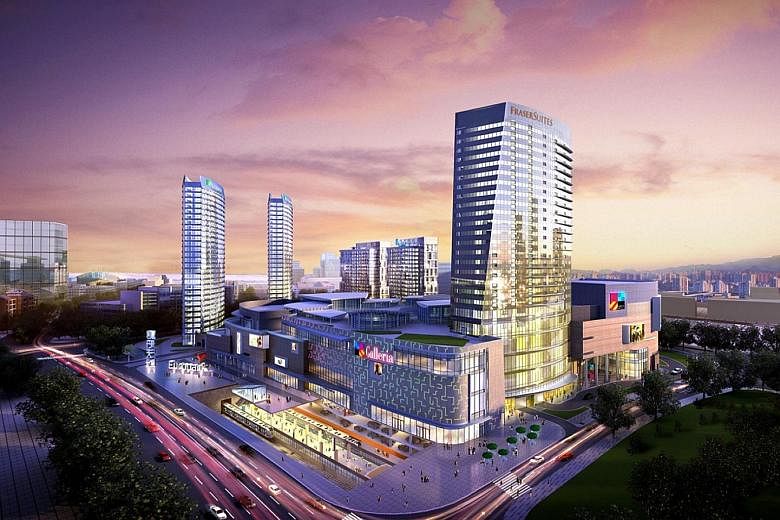Frasers Hospitality is going big in China's second-rank cities, particularly fast-growing ones in an emerging "1.5 tier" segment.
It has acquired a serviced residence in one such city, the major port of Dalian, for 481.37 million yuan ($106 million).
The 259-unit property will be branded Fraser Suites Dalian.
The 1.5-tier segment includes about 10 cities such as Chengdu, Chongqing and Hangzhou on their way to becoming first tier. Many are also linked with the national high-speed rail network.
"If we invest right now, at the right time, we can see the upside," said Frasers' chief executive Choe Peng Sum yesterday.
Dalian, for example, is on the rise, with US$12.47 billion (S$17.5 billion) in foreign direct investment last year.
And while China's economic growth has been moderating, Frasers is taking a long-term view.
MNCs - which form up to 90 per cent of Frasers' clientele in China - are continuing to invest in the country, said Mr Choe.
Occupancy rates at its Chinese serviced residences exceeded 80 per cent over the past year, he noted. Average daily rates (ADRs) have been stable as well.
While first-tier cities like Beijing and Shanghai have grappled with some oversupply, the situation has stabilised and average rates are coming up again, he said.
"My favourite phrase is, you cannot ignore China. Even with a slowdown in economic growth, 6 to 7 per cent growth rate is still decent and cannot be experienced by many other countries... (China) also has an internal consumption demand, and the cities will continue to grow and expand."
Frasers also has many domestic corporate guests and leisure travellers, Mr Choe noted. It partners leading Chinese travel website Ctrip for its bookings.
The focus is on second-tier cities, partly because capital appreciation has run up in first-tier centres, compressing yields. Yet occupancy rates and ADRs in second-tier cities can approach those in their first-tier counterparts, he said.
For example, ADR in a first-tier city can be 900 to 1,500 yuan - Fraser Suites in Shanghai is close to 2,000 yuan - while ADR in a second-tier city can be close to 800 to 1,000 yuan, he pointed out.
At the same time, land and building costs in a first-tier city could be double that of a second-tier one.
Frasers will add 16 properties in China over the next three years, taking its numbers to 30 outlets with over 7,000 rooms. The new properties will be in Changsha, Dalian, Hefei, Nanchang, Shenzhen, Suzhou, Tianjin, Wuxi, Xiamen, Chengdu and Shanghai.
It is set to roll out more serviced residences under its Modena brand, which is focused on second- tier cities, while beginning to grow its hotel-residence hybrid Capri by Fraser brand.
Much of its Chinese growth is through management contracts, with the company often partnering state-owned enterprises which own prime land.
Frasers' project internal rate of return is upwards of 7 per cent in China; for second-tier cities, it achieves "way beyond that", Mr Choe added.
Frasers Hospitality also continues to grow outside of China - it has about 24 properties planned in Asia, including in Tokyo, Jakarta, Myanmar; 10 in the Middle East and Africa; and six in Europe.
Even in a period of global economic uncertainty, hospitality tends to involve a long-term approach, said Mr Choe. "For me, the current correction in China is an intentional correction. I would take a long call on China, and stay focused there."


